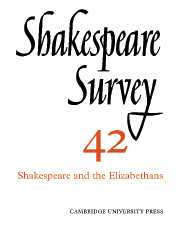Book contents
- Frontmatter
- ‘Jack hath not Jill’: Failed Courtship in Lyly and Shakespeare
- Truth and Art in History Plays
- Chronicles and Mythmaking in Shakespeare’s Joan of Arc
- King John and Embarrassing Women
- Golding’s Ovid, Shakespeare’s ‘Small Latin’, and the Real Object of Mockery in ‘Pyramus and Thisbe’
- Ovid and the Sonnets; or, did Shakespeare Feel the Anxiety of Influence?
- The Play of Sir Thomas More and Some Contemporary Events
- ‘Nobody’s Perfect’: Actors’ Memories and Shakespeare’s Plays of the 1590s
- The Boyhood of Shakespeare’s Heroines
- Shakespeare’s ‘Brawl Ridiculous’
- Shakespeare’s Handwriting
- Shakespeare Performances in England, 1987–8
- Professional Shakespeare Productions in the British Isles, January-December 1987
- The Year's Contributions to Shakespearian Study 1 Critical Studies
- 2 Shakespeare’s Life, Times, and Stage
- 3 Editions and Textual Studies
- Books Received
- Index
Shakespeare Performances in England, 1987–8
Published online by Cambridge University Press: 28 March 2007
- Frontmatter
- ‘Jack hath not Jill’: Failed Courtship in Lyly and Shakespeare
- Truth and Art in History Plays
- Chronicles and Mythmaking in Shakespeare’s Joan of Arc
- King John and Embarrassing Women
- Golding’s Ovid, Shakespeare’s ‘Small Latin’, and the Real Object of Mockery in ‘Pyramus and Thisbe’
- Ovid and the Sonnets; or, did Shakespeare Feel the Anxiety of Influence?
- The Play of Sir Thomas More and Some Contemporary Events
- ‘Nobody’s Perfect’: Actors’ Memories and Shakespeare’s Plays of the 1590s
- The Boyhood of Shakespeare’s Heroines
- Shakespeare’s ‘Brawl Ridiculous’
- Shakespeare’s Handwriting
- Shakespeare Performances in England, 1987–8
- Professional Shakespeare Productions in the British Isles, January-December 1987
- The Year's Contributions to Shakespearian Study 1 Critical Studies
- 2 Shakespeare’s Life, Times, and Stage
- 3 Editions and Textual Studies
- Books Received
- Index
Summary
The establishment by two actors – Kenneth Branagh and David Parfitt – of the Renaissance Theatre Company offering productions directed by other actors seemed designed to consolidate a shift in the balance of power marked by the English Shakespeare Company’s earlier union of the talents of the director Michael Bogdanov and the actor Michael Pennington. And both companies toured during the current year, challenging the theatrical dominance of Stratford and London. The Bogdanov/Pennington completion of the history cycle played mostly overseas, whereas Branagh’s group opened its three-play season in the heart of England, in the studio of the Birmingham Repertory Theatre, and travelled in the provinces before its London season at the Phoenix Theatre. The predominantly young company had only fifteen members, one of whom turned up in five different roles in Hamlet (for the record, Barnardo, Lucianus, First Player, Sailor, and English Ambassador). Settings were simple, though not undecorative, and sometimes made ingenious use of limited resources. Though the directors, new to their roles, disclaimed the attempt to project ‘concepts’ of the plays, these were not emptily neutral productions; each represented a coherent attempt to rethink the play for a modern audience.
- Type
- Chapter
- Information
- Shakespeare Survey , pp. 129 - 148Publisher: Cambridge University PressPrint publication year: 1990

